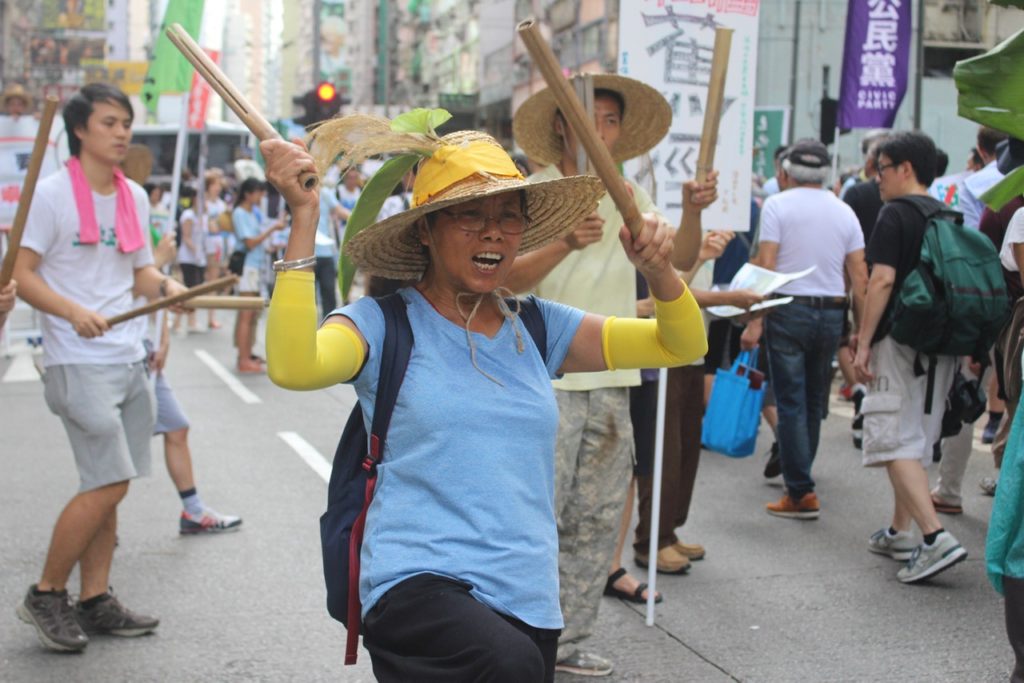Thousands marched through the streets of Hong Kong today for the annual July 1 protest marking the anniversary of the city’s return to Chinese rule 21 years ago.
The pro-democracy, anti-Beijing rally kicked off at about 3pm from Victoria Park’s central lawn, with crowds spilling into the streets, many carrying placards and chanting slogans calling for the “end of one-party dictatorship.”
Organizers say the annual demonstration — held on the anniversary of the city’s 1997 handover from British — has come under increasing pressure from authorities, with police rejecting a number of starting points in the lead up to the march.
Authorities, instead, granted the preferred area to a pro-Beijing group for an event, while there were warnings that people who joined the procession along its route to government headquarters in Admiralty — rather than starting from the approved staging area — “risked arrest” for unlawful assembly.
 Nevertheless, many turned out to express grievances with Beijing and the Hong Kong government on issues ranging from democratic reform, housing prices and land supply to threats to free expression, rural development, pensions, animal welfare and LGBT rights.
Nevertheless, many turned out to express grievances with Beijing and the Hong Kong government on issues ranging from democratic reform, housing prices and land supply to threats to free expression, rural development, pensions, animal welfare and LGBT rights.
Organizer the Civil Human Rights Front — which had hoped for a crowd of 60,000 — estimated about 50,000 had attended, a figure which marked a three-year low, according to local news reports. Police meanwhile pegged attendance at 9,700.
Standing near Victoria Park, a security guard, surnamed Kwok, said he marched because he felt the government increasingly ignored residents’ concerns.
“The Hong Kong government is very one sided, they do not listen to what the public say,” he said.
“I want more opportunities to express my opinion. [Though] there are fewer people and people feel more hopeless, but as long as I come out, I feel there is a chance for change.”
A office worker standing nearby, surnamed Yeung, said she was also frustrated with the city’s leaders.
“Hong Kong’s government is becoming less free,” Yeung, in her 30s, said, adding the situation for young people was “very poor” and if she had the money, she would leave the city for good.

“We are marching against Hong Kong’s state of housing, the economy, education and the highest-ranking officials, Carrie Lam, and against China. The officials are acting in their own interests, and not upholding one country, two systems.”
Alvin Yeung, leader of the Civic Party, attributed the lower turnout, in part, to chief executive Lam’s less combative style, in contrast with her divisive predecessor, CY Leung.
“Since Carrie Lam took over there has been less controversy,” said the lawmaker, speaking in Causeway Bay.
“She is more soft spoken than CY Leung, but the main issues remain unsolved,” he said, citing Hong Kong’s critical housing crisis, economic inequality and the controversial co-location bill — which will see mainland security officials stationed at an immigration checkpoint in the heart of Hong Kong — among chief concerns.

“We have to tell people that though the surface looks harmonious, if you look in the substance and deeper inside, we still have got a growing gap between poor and rich. “
Nearby, Civil Human Rights Front volunteer Lai Chung said although fewer people had turned up, she believed more Hongkongers had become politically engaged since the 2014 Umbrella Movement, which saw student-led protesters occupy several sites around Hong Kong in a campaign for democratic reform.
“We live in Hong Kong and should be proud and should want to protect our rights,” she said.
Marchers along the route were at several points met with shouts and jeers from pro-Beijing groups waving Chinese flags.

Among them was the Treasure Group, whose chairman Sandy Li Pik-yee criticized participants, saying students in particular had “spreading lies” about China.
“A lot of young people are anti-China, but when you ask young people what China has done to make to them angry, they don’t know how to respond,” she told Coconuts HK.
Counter-protesters, however, were overwhelmingly outnumbered.
Pro-democracy stalwart Albert Ho, chairman of the Hong Kong Alliance in Support of Patriotic Democratic Movements in China, said the march was a important display of residents’ freedom of expression.
“Whether we can achieve our goal is a separate matter but at least we can stand up and speak what we want,” said Ho, holding a banner protesting the house arrest of Liu Xia, the wife of late Nobel laureate Liu Xiaobo.

Watching on from the roadside, another longtime pro-democracy figure, former lawmaker Martin Lee, said that there were “more reasons for people to protest than last year.”
“Things are continuing to go wrong and our chief executive has not mentioned anything about democracy,” he said.
“She has a duty to write a report to Beijing to recommend giving democracy to Hong Kong, and she has done absolutely nothing.”






Reader Interactions